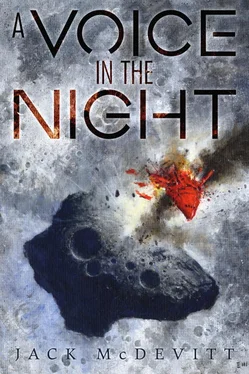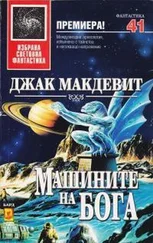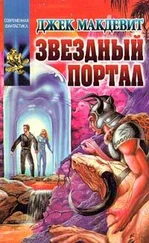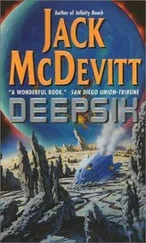Jack McDevitt
A VOICE IN THE NIGHT
JACK McDEVITT, HISTORY BUILDER

By Martin L. Shoemaker
In the fieldof science fiction writing—a field that Jack McDevitt has worked in for 37 years—they teach us about world building . This is the art of crafting a new world where the story takes place. The world might be almost the same as our own, or wildly different; but the author’s task is to make the differences believable, consistent, and comprehensible, so the reader can better understand the challenges that the characters face.
I would say that Jack is an excellent world builder, but that doesn’t go far enough. Jack McDevitt doesn’t just build worlds, he builds histories .
Most good world building includes some measure of history. Your world isn’t just what it is when the reader enters the story, it’s also what happened before and how that shaped the “present” of the tale. But Jack takes that to the next level. When I try to explain Jack McDevitt’s work, the phrase I keep coming back to is “archaeological science fiction.”
Now that’s not entirely accurate. Alex Benedict (protagonist of Jack’s first major series) is a treasure hunter, despised by professional archeologists. Priscilla Hutchins (protagonist of the Academy series), is first and foremost a starship pilot. It’s only chance that draws her into investigations of ancient civilizations.
Chance? Or Jack’s recurring theme? The Hercules Text , Ancient Shores , and Eternity Road all share this theme to one degree or another. Jack writes worlds with history ; and those histories contain mysteries. In this, Jack’s worlds reflect our own. We are the sum of what we were. We stand at the intersection of where we’ve been and where we can be. And if we don’t know our past, our present and our future have gaps.
Jack likes to find the stories in those gaps. And he’s really good at it.
Jack didn’t invent the archeological science fiction niche, of course. Asimov plumbed it in “Nightfall” and the Foundation series. Clarke explored historical mysteries in 2001: A Space Odyssey and the Rama series. (Hmmm… Maybe Stephen King was onto something when he dubbed Jack “The logical heir to Isaac Asimov and Arthur C. Clarke.”) But Jack has moved into this niche and made himself comfortable.
So if you know Jack’s work, you won’t be surprised to find that many of these stories relate to past mysteries: either our own past, or some future world where we are in the past. Stories in this vein include “Searching for Oz” (an alternate history of the SETI program), “The Adventure of the Southsea Trunk” (another alternate history—to say more would give you clues you should discover on your own), “Combinations” and “The Play’s the Thing” (two variations on a radical approach to historical reenactment), “Midnight Clear” (a teen girl searches for inspiration in an alien archeological site), “Friends in High Places” (what might be called alternate theological history), and “The Pegasus Project” (an investigation of an ancient radio signal).
But as much as Jack excels at history building, this collection is broader than that. It includes not one but two homages to Jack’s favorite fictional detective. Jack indulges his wry humor in “Listen Up, Nitwits” (and other places throughout the book). From high tech rescue on the Moon to superscience at Niagara Falls to a tourist destination near a black hole, he shows his deft hand with the science in science fiction. For Priscilla Hutchins fans, he even includes two stories from Hutch’s first flight as a starship captain (plus “Oculus,” an Academy story in which Hutch does not appear).
And most important, these stories show an emotional range from the harsh analysis of facts and data to the deepest questions of the human heart. “Ships in the Night,” in particular, starts almost whimsically, but evolves into a moving story of sacrifice and impossible friendship. The sense of nostalgia and loss in “It’s a Long Way to Alpha Centauri,” “The Last Dance,” and “Cathedral” would be right at home in a Bradbury collection. And in “A Voice in the Night,” Old-Time Radio inspires a young Alex Benedict’s career, and his sense of wonder.
All right, enough of my words. They’re just keeping you from Jack’s, the words you came here for. You’ll be glad I got out of your way and let you start reading.
Martin L. Shoemaker is a programmer who writes on the side… or maybe it’s the other way around. Programming pays the bills, but a second-place story in the Jim Baen Memorial Writing Contest earned him lunch with Buzz Aldrin. Programming never did that! He was the 2016 recipient of the Washington Science Fiction Association’s Small Press Award for his Clarkesworld story “Today I Am Paul,” which also appeared in four different year’s best anthologies and eight international translations. His work has appeared in Analog , Galaxy’s Edge , Digital Science Fiction , Forever Magazine , and Writers of the Future Volume 31.
SEARCHING FOR OZ

Solomon Martin would probably not have been part of the biggest scientific breakthrough of the twentieth century, and maybe ever, had he not read The War of the Worlds in 1907 when he was in the sixth grade. Radio was in its early stages at the time, the Martians got into his head, and he built his own crystal receiver two years later and aimed it at the red planet. He was of course disappointed by the unrelenting silence. His system, he decided, just wasn’t good enough. He needed something better.
During World War I he served as a communications specialist under Edwin Armstrong. He maintained later that he had contributed ideas to Armstrong that led to the development of the superheterodyne receiver and eventually to FM radio. I can’t say how much of that was true. What I knew about him was simply that he was a decent guy and he never really let go of the idea of establishing radio contact with Martians. And okay, that was only half serious. But while the rest of us were talking about playing for the Philadelphia A’s, he was experimenting with radio waves.
Any chance he might have had for a normal existence probably went away when Emily, his wife of two years, died during the great flu epidemic. After that he devoted his life exclusively to radio technology. And he never really got away from building ever larger antennas in his back yard. But despite its canals, Mars remained silent. Sol became an amateur astronomer while launching the White Star Radio Company, which built and sold quality receivers.
He survived successive jolts during the 1920s. The Milky Way, it turned out, was not the entire universe, but only a miniscule part of a vastly larger system. Then came the news that, despite the popular notion that the universe was immutable and unchangeable, it was in fact changing. It was expanding. And finally, better telescopes revealed that the canals were an illusion. It seemed for a time as if science simply couldn’t be trusted to make up its mind.
The great cosmic question, as Sol explained it to me one summer afternoon in the midst of the Depression, was whether there was intelligent life anywhere else. “I don’t know why that seems so important,” he said. “But somehow it’s the only cosmic issue that really matters.”
Читать дальше











